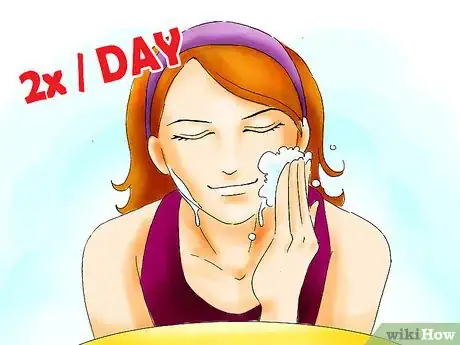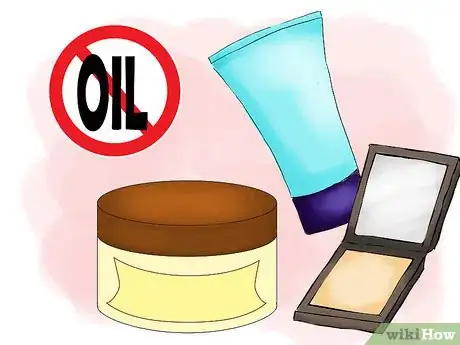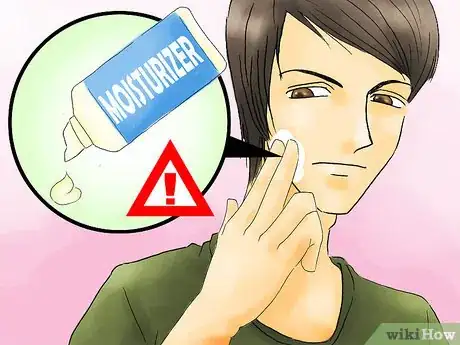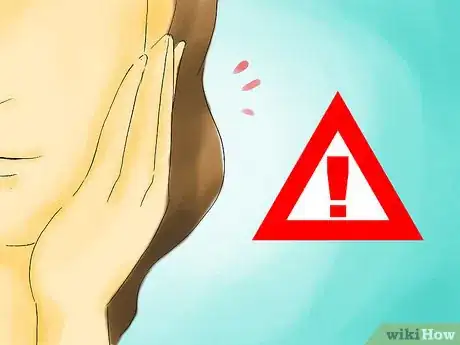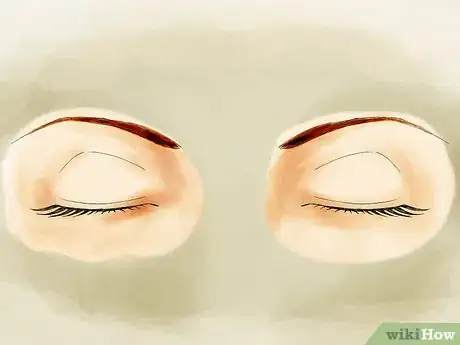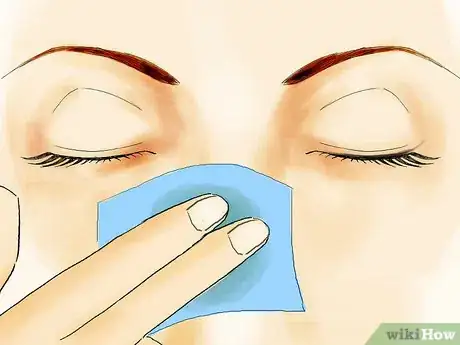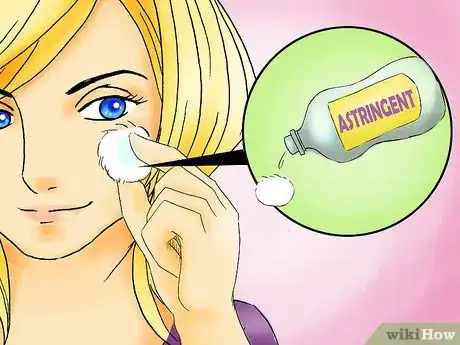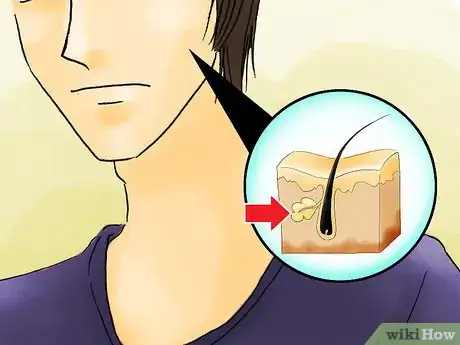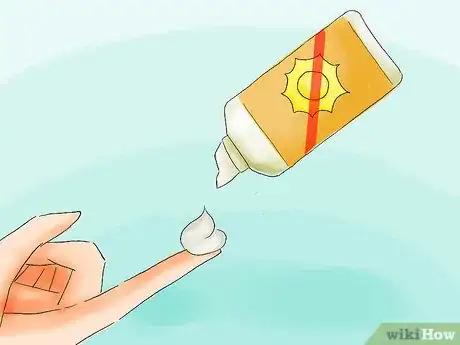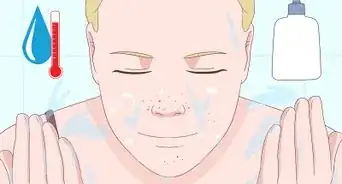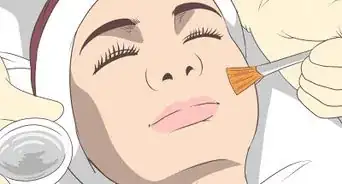This article was co-authored by Mohiba Tareen, MD. Mohiba Tareen is a board certified Dermatologist and the founder of Tareen Dermatology located in Roseville, Maplewood and Faribault, Minnesota. Dr. Tareen completed medical school at the University of Michigan in Ann Arbor, where she was inducted into the prestigious Alpha Omega Alpha honor society. While a dermatology resident at Columbia University in New York City, she won the Conrad Stritzler award of the New York Dermatologic Society and was published in The New England Journal of Medicine. Dr. Tareen then completed a procedural fellowship which focused on dermatologic surgery, laser, and cosmetic dermatology.
There are 12 references cited in this article, which can be found at the bottom of the page.
This article has been viewed 142,146 times.
Oily skin occurs when the oil glands in your skin start to produce excess oil. It’s a natural process that you cannot stop, but you can take steps to manage and care for oily skin. Oily skin can be uncomfortable and unpleasant, but by having a good skincare routine and being gentle with your skin you can ease the problem.
Steps
Keeping Your Face Clean
-
1Wash your face twice a day. Having a good cleaning and skincare routine is the most important thing you can do to care for oily skin. Gently clean your face twice a day, morning and night, with warm water and soap, or a soapless facial cleanser.[1] Use a gentle cleanser at first, as a harsher cleanser can actually increase oil production.
- If a normal cleanser does not reduce the oiliness of your skin, consider a cleanser that includes benzoyl peroxide, salicylic acid, glycolic acid, or beta hydroxy acid.[2]
- Start with a cleanser with benzoyl peroxide. This chemical is used specifically to treat mild to moderate acne.[3]
- A chemical cleanser like this might lead to side-effects, such as drying, redness and scaling. These effects often recede after the first month of using the cleanser.[4]
- You may have to try a number of different products to see which one works best for you.[5]
- Use your hands to clean your face and do not use a washcloth or loofah. Pat your face dry afterwards — do not rub or irritate the skin.
-
2Use oil-free cosmetics. If you have oily skin, it is important that you choose cosmetics that will not exacerbate it. Check the labels carefully and always opt for “oil-free” or “water-based” cosmetics.[6] There is some uncertainty about the direct effect of cosmetics on oil production, but heavy makeup may block your pores.[7]
- If you can go without, try holding off on products like foundation. Keep your makeup minimal (like using mascara and lipstick only) to avoid clogging pores.
Advertisement -
3Use moisturizers selectively. Often people with oily skin will steer clear of moisturizers, thinking that their skin doesn’t need any extra lubrication, but this is not true. Those with oily skin still need to moisturize. Certainly oily moisturizers should be avoided, along with anything that might further clog up your skin. Oil-free moisturizers, however, can help you achieve a balance in your skin.
- Vary the amount you apply according to the parts of your face that are oilier or drier.[8]
- Choose the product carefully, and look for a non-oily non-comedogenic moisturizer.[9] Look for products specifically tailored to those with oily skin. Some cosmetic lines, like Clinique, have different lines for different types of skin, including oily skin.
- Avoid any moisturizers that contain lanolin, petrolatum or isopropyl myristate.[10]
- Look at online reviews for some pointers, and consider a gel moisturizer that has a different texture to lotions.[11]
-
4Don’t over-wash your face.[12] If you have oily skin, you may be tempted to keep washing it throughout the day to tackle the oil build-up. Avoid this temptation, and try to wash your face only in the morning and evening. Washing more often can dry out your skin and cause irritation.
- You may try washing your skin once during the day if it is exceptionally oily.[13]
- You can wash your face more than twice a day if you have been sweating.
-
5Be mindful of what touches your face. Although the oiliness of your skin is largely genetic and the oil is produced below the surface of the skin, it’s a good idea to be mindful of what touches your skin. If you have greasy hair and it is falling over your face, some of this greasiness will be transferred to your skin.
- If you have grubby hands and keep touching your face, you will be spreading the oil around.
- Keep your hair and hands clean and off your face.[14]
Tackling Excess Oiliness
-
1Try face masks. Face masks and clays can be effective in drawing out the oil from the skin, but there is also a danger that overuse will result in excess dryness and irritation. Be wary of this when you use masks, and try to concentrate them on the areas of your skin that are the oiliest. Don’t use masks or clays too frequently. Instead only use them ahead of a special occasion, such as a party or big presentation at work.[15]
- You can look for masks especially designed for oily skin.
- Be prepared to try out a few to see which one works best for you.
-
2Use blotting pads. If your skin gets oily throughout the day it can be upsetting, and constantly washing your face is likely to only make it worse. You can, however, use simple blotting pads to remove excess oil from the surface of your skin. This is a good way to remove the oily shine during the day, which you can do subtly and quickly no matter where you are or what you’re doing.[16]
- There are a number of over-the-counter blotting pad products you can buy that will help remove shine during the day.
- You can also just use a tissue or some toilet paper.
- Be sure to be gentle with your skin, and don’t scrub at it.
-
3Consider using a mild astringent. Astringent toners are quite commonly included in skincare regimens, but you should be wary of using one that is drying or harsh on your skin. Drying the skin with a strong toner is not the way to tackle oily skin, and will only make the situation worse. If you do want to use a toner, make sure you stick to a light alcohol-free and oil-free one.
- Only apply it to the oiliest areas of your skin.
- If you find that you are getting dry patches of skin, stop using the astringent.
- Remember that most people’s skin is a combination of dry and oily, so you should adapt your approach for the different areas of your skin.[17]
-
4Talk to a medical professional. Make an appointment to talk to your doctor or dermatologist if you are sticking to a good skincare routine, but you find that the oiliness does not diminish. They will be able to advise you on what further steps you can take, and may even prescribe you some medication.
- The choice of therapy should be individualized, depending on the severity and type of skin problems, as well as tolerance and other factors. Your doctor can help specifically tailor your skincare routine to your skin type.
- Remember that oil production is perfectly natural and normal.
- If the situation is upsetting you, ask for some professional help.[18]
Looking After Your Skin
-
1Recognise what causes oily skin. Oily skin is caused by excess skin oil (or sebum), which begins to occur for both males and females during puberty. The amount of oil produced varies from person to person, but for some people there will be an excess of oil, giving the skin a shiny and oily look.
- After puberty the oil production generally subsides, but problems with oily skin can continue into adulthood.
- Oily skin is often exacerbated by hot and humid weather conditions.
- Oily skin can be uncomfortable and upsetting, and those with oily skin tend to suffer more from acne.[19]
-
2Reduce your stress levels. If you have oily skin and acne, heightened stress levels may exacerbate the problem.[20] Adopt a healthy lifestyle and try to find ways to relax. To calm down at a particular moment try doing some deep breathing, or even some gentle yoga or meditation.
- Going out for a walk can help you to clear your head while getting some exercise.
- Make exercise a regular part of your daily routine to help you blow off some steam.
-
3Have a healthy diet. It is a myth that greasy foods lead directly to greasy skin and acne, but it’s important to have a healthy diet to promote good overall health and well-being. Some foods, including those rich in carbohydrates, such as bread, may trigger acne. The oiliness of your skin does not depend on what you eat, but if you work in a kitchen, oil can stick to your skin and block your pores.[21]
-
4Protect your skin from the sun.[22] Thick sunscreens can be difficult for people with oily skin, as the heavy liquid will add new oiliness to your skin and block your pores. It is, however, absolutely vital to protect your skin from the sun. When you are buying sunscreen look for “oil-free” options, and products designed especially for those with oily skin.
- Sunscreen gels are generally less likely to block your pores than lotions or creams.
- Choose a sunscreen that has broad spectrum coverage with an SPF of at least 30. Make sure that the sunscreen is water-resistant. Apply at least 15 minutes before you go in the sun and wear it daily.
Expert Q&A
-
QuestionWhat's an easy way to prevent my skin from getting oily?
 Mohiba Tareen, MDMohiba Tareen is a board certified Dermatologist and the founder of Tareen Dermatology located in Roseville, Maplewood and Faribault, Minnesota. Dr. Tareen completed medical school at the University of Michigan in Ann Arbor, where she was inducted into the prestigious Alpha Omega Alpha honor society. While a dermatology resident at Columbia University in New York City, she won the Conrad Stritzler award of the New York Dermatologic Society and was published in The New England Journal of Medicine. Dr. Tareen then completed a procedural fellowship which focused on dermatologic surgery, laser, and cosmetic dermatology.
Mohiba Tareen, MDMohiba Tareen is a board certified Dermatologist and the founder of Tareen Dermatology located in Roseville, Maplewood and Faribault, Minnesota. Dr. Tareen completed medical school at the University of Michigan in Ann Arbor, where she was inducted into the prestigious Alpha Omega Alpha honor society. While a dermatology resident at Columbia University in New York City, she won the Conrad Stritzler award of the New York Dermatologic Society and was published in The New England Journal of Medicine. Dr. Tareen then completed a procedural fellowship which focused on dermatologic surgery, laser, and cosmetic dermatology.
FAAD Board Certified Dermatologist Be careful not to over-exfoliate since it can irritate your skin and make your body produce more oil.
Be careful not to over-exfoliate since it can irritate your skin and make your body produce more oil. -
QuestionHow can I care for acne as well as oily skin?
 Chris M. Matsko, MDDr. Chris M. Matsko is a retired physician based in Pittsburgh, Pennsylvania. With over 25 years of medical research experience, Dr. Matsko was awarded the Pittsburgh Cornell University Leadership Award for Excellence. He holds a BS in Nutritional Science from Cornell University and an MD from the Temple University School of Medicine in 2007. Dr. Matsko earned a Research Writing Certification from the American Medical Writers Association (AMWA) in 2016 and a Medical Writing & Editing Certification from the University of Chicago in 2017.
Chris M. Matsko, MDDr. Chris M. Matsko is a retired physician based in Pittsburgh, Pennsylvania. With over 25 years of medical research experience, Dr. Matsko was awarded the Pittsburgh Cornell University Leadership Award for Excellence. He holds a BS in Nutritional Science from Cornell University and an MD from the Temple University School of Medicine in 2007. Dr. Matsko earned a Research Writing Certification from the American Medical Writers Association (AMWA) in 2016 and a Medical Writing & Editing Certification from the University of Chicago in 2017.
Family Medicine Physician You may want to employ a multifactorial approach. Using and benzoyl peroxide soap or lotion may help. Perhaps use an astringent. If you find there measure too harsh use a gentle cleanser like Cetaphil. Make and appoint with a dermatologist to see if there is medication that can help your oily skin.
You may want to employ a multifactorial approach. Using and benzoyl peroxide soap or lotion may help. Perhaps use an astringent. If you find there measure too harsh use a gentle cleanser like Cetaphil. Make and appoint with a dermatologist to see if there is medication that can help your oily skin. -
QuestionHow to reduce the redness of acne?
 Chris M. Matsko, MDDr. Chris M. Matsko is a retired physician based in Pittsburgh, Pennsylvania. With over 25 years of medical research experience, Dr. Matsko was awarded the Pittsburgh Cornell University Leadership Award for Excellence. He holds a BS in Nutritional Science from Cornell University and an MD from the Temple University School of Medicine in 2007. Dr. Matsko earned a Research Writing Certification from the American Medical Writers Association (AMWA) in 2016 and a Medical Writing & Editing Certification from the University of Chicago in 2017.
Chris M. Matsko, MDDr. Chris M. Matsko is a retired physician based in Pittsburgh, Pennsylvania. With over 25 years of medical research experience, Dr. Matsko was awarded the Pittsburgh Cornell University Leadership Award for Excellence. He holds a BS in Nutritional Science from Cornell University and an MD from the Temple University School of Medicine in 2007. Dr. Matsko earned a Research Writing Certification from the American Medical Writers Association (AMWA) in 2016 and a Medical Writing & Editing Certification from the University of Chicago in 2017.
Family Medicine Physician It is hard to reduce redness. Some medications that a dermatologist can put you on make your skin red and sensitive to light. I would recommend a gentle cleanser that does not irritate the skin.
It is hard to reduce redness. Some medications that a dermatologist can put you on make your skin red and sensitive to light. I would recommend a gentle cleanser that does not irritate the skin.
References
- ↑ https://www.nlm.nih.gov/medlineplus/ency/article/002043.htm
- ↑ Mohiba Tareen, MD. FAAD Board Certified Dermatologist. Expert Interview. 26 March 2020.
- ↑ http://www.webmd.com/drugs/2/drug-1344/benzoyl-peroxide-topical/details
- ↑ http://www.mayoclinic.org/diseases-conditions/acne/basics/lifestyle-home-remedies/con-20020580
- ↑ http://www.webmd.com/skin-problems-and-treatments/acne/features/oily-skin
- ↑ https://www.nlm.nih.gov/medlineplus/ency/article/002043.htm
- ↑ http://www.mayoclinic.org/diseases-conditions/acne/basics/lifestyle-home-remedies/con-20020580
- ↑ http://www.webmd.com/skin-problems-and-treatments/acne/features/oily-skin?page=2
- ↑ http://www.mayoclinic.org/diseases-conditions/acne/basics/lifestyle-home-remedies/con-20020580
- ↑ http://abcnews.go.com/GMA/story?id=126810&page=1
- ↑ http://www.telegraph.co.uk/beauty/skin/moisturisers-for-oily-skin-tried-and-tested/
- ↑ Mohiba Tareen, MD. FAAD Board Certified Dermatologist. Expert Interview. 26 March 2020.
- ↑ http://goaskalice.columbia.edu/answered-questions/what-can-i-do-take-care-my-very-oily-hair-and-skin
- ↑ http://www.mayoclinic.org/diseases-conditions/acne/basics/lifestyle-home-remedies/con-20020580
- ↑ http://www.webmd.com/skin-problems-and-treatments/acne/features/oily-skin?page=2
- ↑ http://goaskalice.columbia.edu/answered-questions/what-can-i-do-take-care-my-very-oily-hair-and-skin
- ↑ http://www.webmd.com/skin-problems-and-treatments/acne/features/oily-skin
- ↑ http://www.webmd.com/skin-problems-and-treatments/acne/features/oily-skin?page=3
- ↑ http://www.niams.nih.gov/Health_Info/Acne/#acne_b
- ↑ http://www.mayoclinic.org/diseases-conditions/acne/basics/causes/con-20020580
- ↑ http://www.mayoclinic.org/diseases-conditions/acne/basics/causes/con-20020580
- ↑ Mohiba Tareen, MD. FAAD Board Certified Dermatologist. Expert Interview. 26 March 2020.
About This Article
There are a few simple changes you can make to your habits to care for your oily skin. One of the best ways to tackle oily skin is developing a good skincare routine. This includes washing your face twice a day with a gentle cleanser, moisturizing your face after washing it with an oil-free moisturizer, and only using oil-free cosmetics. While you wait for your skincare routine to start working, there there are things you can do to get rid of excess oil on your face throughout the day. You can dab your face with blotting papers, apply a mild astringent to oily areas with a cotton ball, or do a clay face mask ahead of a special occasion. There are even lifestyle changes you can make help care for your oily skin, like eating a healthy diet, always wearing sunscreen when you go outside, and doing things to lower your stress like meditation or yoga. All of these changes can take some time to start working, so don't give up and keep trying things until you find what works best for you. For more tips from our Medical co-author, including how to avoid transferring oil to your skin, read on!
